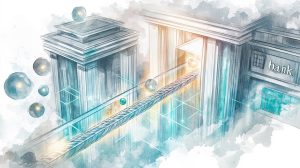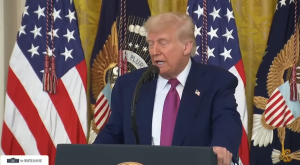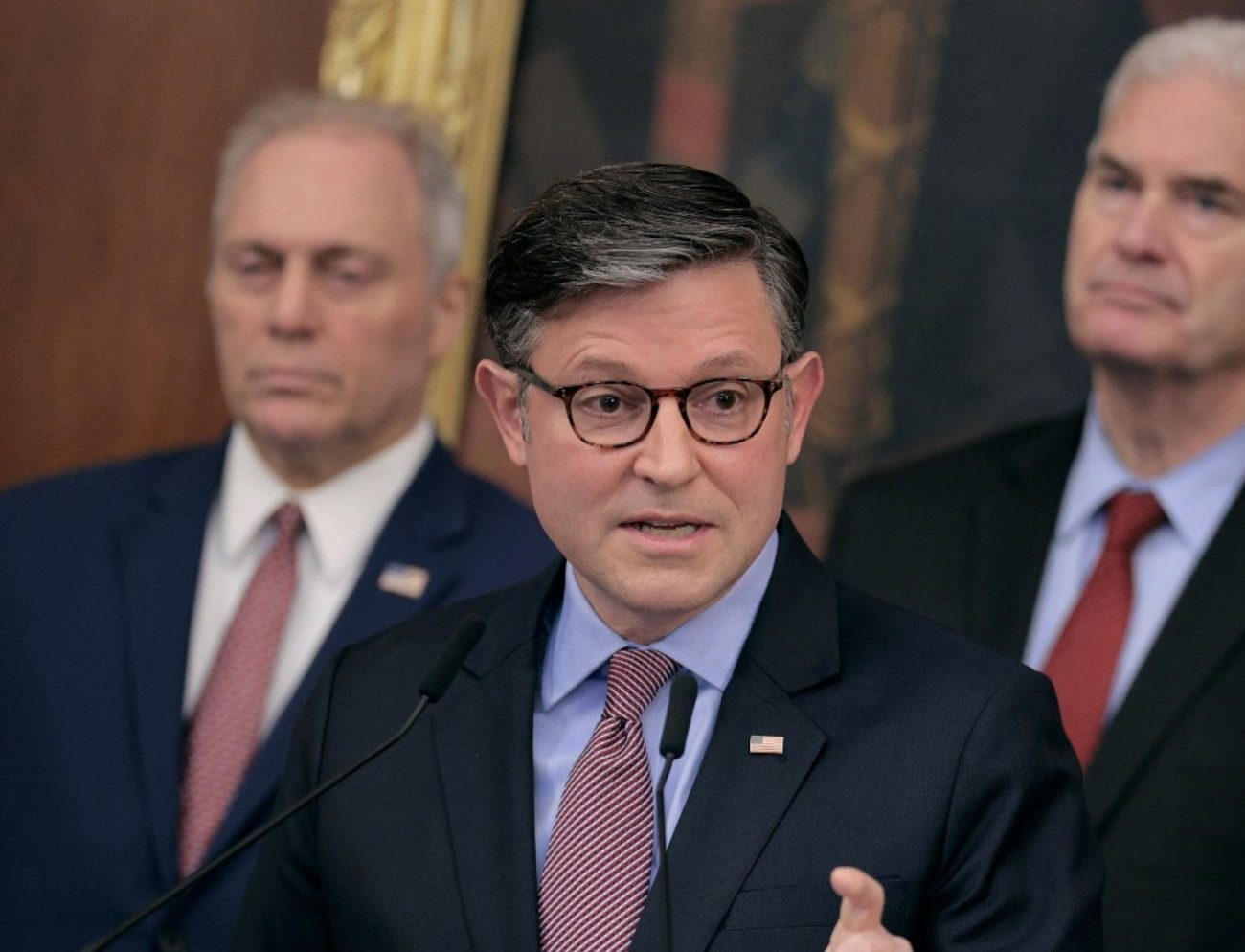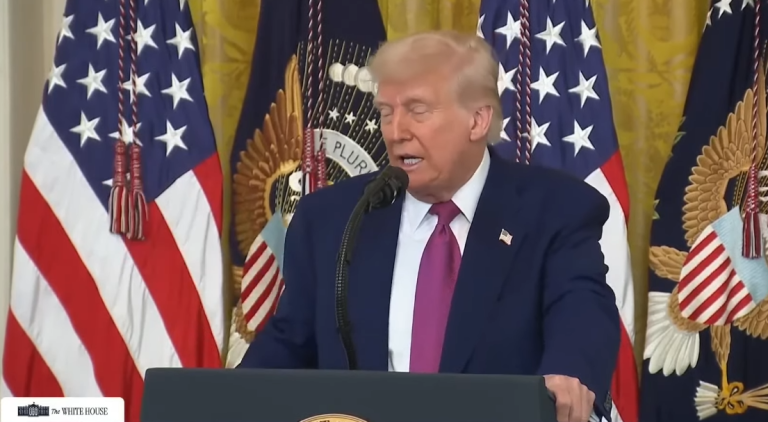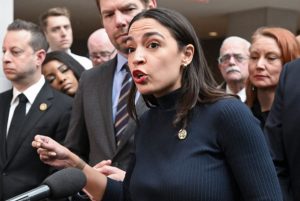WASHINGTON, D.C. — House Speaker Mike Johnson (R–La.) intensified his criticism of Senate Democrats on Monday, claiming they are prolonging the ongoing government shutdown by demanding billions of dollars in new spending, including what he described as $200 billion in health benefits for noncitizens and “billions more” for foreign programs.
The remarks came as the Trump administration continues identifying potential spending cuts to keep key federal services operating amid a funding lapse now entering its fourth week.
“Day 27 means it’s almost been a full month since the Democrats shut down the government,” Johnson said during a Capitol Hill press briefing. “The pain being felt by so many hard-working people around this country is very real, and it gets worse with each passing day.”
Government Workers Feeling the Strain
Johnson said the shutdown has left 1.4 million federal workers without a paycheck, including thousands of employees deemed “essential” — such as TSA agents, air traffic controllers, Border Patrol officers, and military personnel.
“Many of these individuals are still reporting for duty,” the Speaker noted. “Our troops, our controllers, and so many others are now at very real risk of missing their paycheck at the end of this month.”
Johnson emphasized that the Trump administration has been searching for “creative funding mechanisms” within existing federal accounts to temporarily mitigate the impact on families, but he admitted that “it is getting more challenging with each day.”
“The administration has done everything possible to bend over backwards to cover the bases,” he said. “But at some point, Democrats have to come to the table.”
WATCH:
Johnson Points to the Senate
The Speaker argued that while House Republicans have voted multiple times to pass measures reopening the government, Senate Democrats have repeatedly rejected them.
“Every Republican in Congress wants to stop this madness,” Johnson said. “We have voted more than a dozen times — thirteen to be exact — to reopen the government. But we cannot do it on our own. It’s simple math: you need 60 votes in the Senate, and we only have 53 Republicans.”
Johnson accused Democrats of “refusing to act” and of shifting blame to avoid accountability.
“They’re the ones voting repeatedly to shut down the government,” he asserted. “They keep saying Republicans are in charge, but that’s simply false. Sixty votes control the Senate, not a bare majority.”
He added, “Democrat votes are required to open the government. They refuse to do it. They have now voted twelve times to keep the government closed — and they’ll have another chance this week.”
The Speaker’s ‘Four Facts’
During his remarks, Johnson presented what he called a “visual aid” — a printed chart summarizing what he described as “four simple facts” about the shutdown.
The first two, he said, were straightforward:
-
Democratic votes are required to reopen the government.
-
Democrats have repeatedly voted against doing so.
But his third point — the conditions Democrats have allegedly attached to any reopening deal — drew the most attention.
“They’ve tried to confuse the American people,” Johnson said. “They’ve said this is about healthcare or climate or other things, but it’s very simple. They put their demands in writing, and they’ve been part of the Senate record for weeks.”
According to Johnson, Democratic negotiators have sought to include:
-
$200 billion in taxpayer-funded health benefits for illegal immigrants and noncitizens,
-
billions of dollars in foreign aid he characterized as “wasteful,”
-
$500 million in subsidies for left-leaning news organizations, and
-
$50 billion in cuts to rural hospitals.
“They’re demanding all this as the price to reopen the government for hardworking Americans,” Johnson said. “We cannot — and will not — do that. And they know it.”
White House and Senate Democrats Push Back
Democratic leaders have disputed Johnson’s claims, calling them a distortion of what remains a complex series of budget negotiations. A senior Democratic aide told reporters that the party’s proposals center on maintaining “basic public health and foreign assistance funding” that had already been approved in previous bipartisan spending bills.
“Speaker Johnson is misleading the public,” the aide said. “There is no $200 billion line item for undocumented immigrants. The administration’s request concerns routine public health and humanitarian programs that prevent disease outbreaks and fund emergency medical care for children.”
Senate Majority Leader Chuck Schumer (D–N.Y.) similarly rejected the charge that Democrats are using the shutdown to pursue ideological goals.
“This shutdown began because Republicans refused to accept a bipartisan agreement that both chambers were close to finalizing,” Schumer told reporters. “We’ve passed multiple clean funding bills. Speaker Johnson and the president simply refuse to bring them up.”
Behind the Standoff
The standoff began when negotiations over a short-term spending bill collapsed earlier this month. The administration’s proposed budget includes significant increases for defense, border enforcement, and law enforcement operations — cuts elsewhere that Democrats say target healthcare, housing, and social programs.
White House officials say the Office of Management and Budget (OMB) has been reviewing federal programs for potential rescissions or deferrals to keep essential services operating.
“We are identifying non-essential discretionary spending that can be suspended during the shutdown,” one senior official said. “Our priority is maintaining national security, border protection, and public safety.”
But with the stalemate entering its fourth week, both parties face growing public frustration.
A Reuters/Ipsos poll released Monday found that 58 percent of Americans now blame both parties equally for the shutdown, while 27 percent place greater responsibility on Democrats and 15 percent on Republicans.
Political Pressure Mounts
Behind the scenes, several Republican lawmakers have privately urged Johnson to reach a compromise, warning that prolonged economic strain could erode public support for the party heading into next year’s midterms.
Still, Johnson’s allies say he remains firmly aligned with President Trump’s push to reduce federal spending and reassert control over the budget process.
“Speaker Johnson has been one of the strongest voices for fiscal responsibility in decades,” said Rep. Elise Stefanik (R–N.Y.), a member of House leadership. “He’s standing up for taxpayers against a Senate that wants to spend without limits.”
Democrats, meanwhile, accuse Republicans of using the shutdown as leverage to advance unrelated policy goals, including restrictions on federal healthcare funding for migrants and tighter conditions for foreign aid.
“This is governing by hostage-taking,” said Sen. Chris Murphy (D–Conn.). “They are keeping millions of Americans out of work because of a fight over immigration policy that doesn’t belong in a funding bill.”
Impact on Everyday Americans
The shutdown’s effects have rippled across the country — from delayed paychecks for federal employees to suspended grant programs and travel disruptions at major airports.
Economists warn that if the standoff continues, GDP growth could slow by up to 0.5 percent in the fourth quarter. Small businesses relying on federal contracts are already reporting severe cash flow challenges.
“Every day this goes on, the uncertainty grows,” said David Wasserman, a budget analyst at the nonpartisan Congressional Research Service. “Even if a deal is reached soon, it will take weeks to unwind the backlog.”
Johnson’s Closing Message
As his press conference concluded, Johnson reiterated his call for Democrats to agree to a deal without what he called “extraneous spending demands.”
“The American people deserve a functioning government,” he said. “We can fund our military, secure our borders, and reopen this government — but we cannot do it if the other side insists on giveaways for illegal immigrants and foreign governments.”
Johnson added that Republicans would continue voting on short-term funding measures this week “to keep faith with the American people.”
For now, however, no clear path to resolution is visible. Both parties remain entrenched, and the fiscal standoff shows few signs of abating — a reflection of the deeper partisan divide shaping Washington’s political landscape heading into 2026.

James Jenkins is a celebrated Pulitzer Prize-winning author whose work has reshaped the way readers think about social justice and human rights in America. Raised in Atlanta, Georgia, James grew up in a community that instilled in him both resilience and a strong sense of responsibility toward others. After studying political science and creative writing at Howard University, he worked as a journalist covering civil rights issues before dedicating himself fully to fiction. His novels are known for their sharp, empathetic portraits of marginalized communities and for weaving personal stories with broader political realities. Jenkins’s breakout novel, Shadows of Freedom, won national acclaim for its unflinching look at systemic inequality, while his more recent works explore themes of identity, resilience, and the fight for dignity in the face of oppression. Beyond his novels, James is an active public speaker, lecturing at universities and participating in nonprofit initiatives that support literacy and community empowerment. He believes that storytelling is a way to preserve history and inspire change. When not writing, James enjoys jazz music, mentoring young writers, and traveling with his family to explore cultures and stories around the world.
